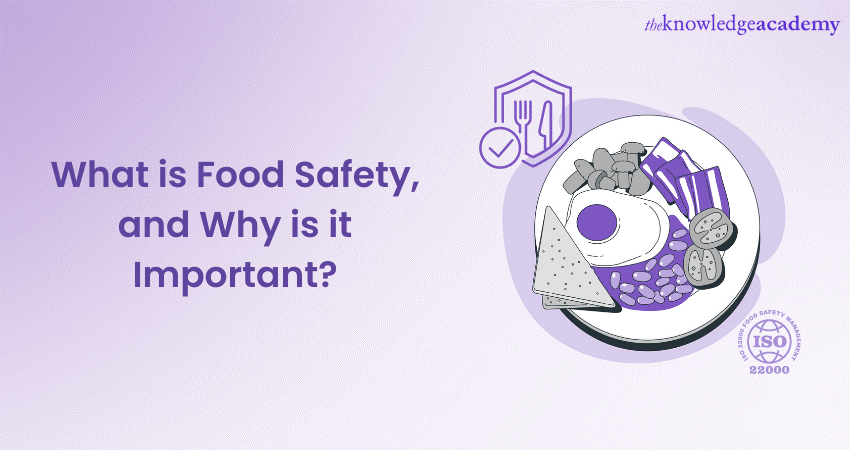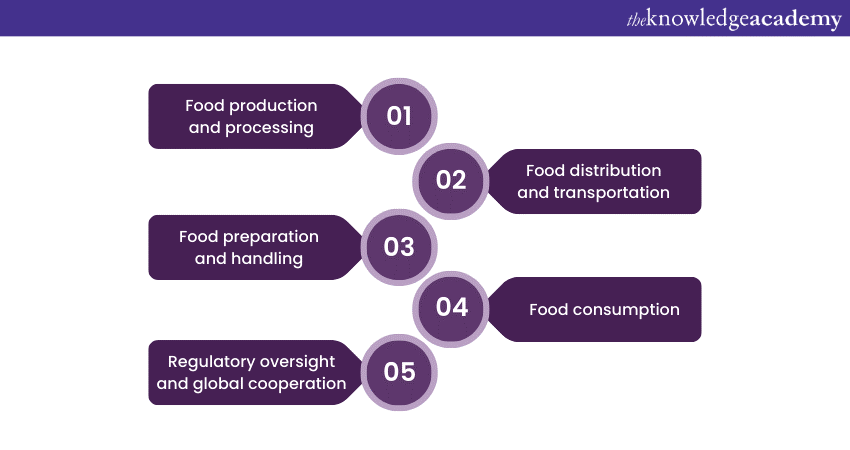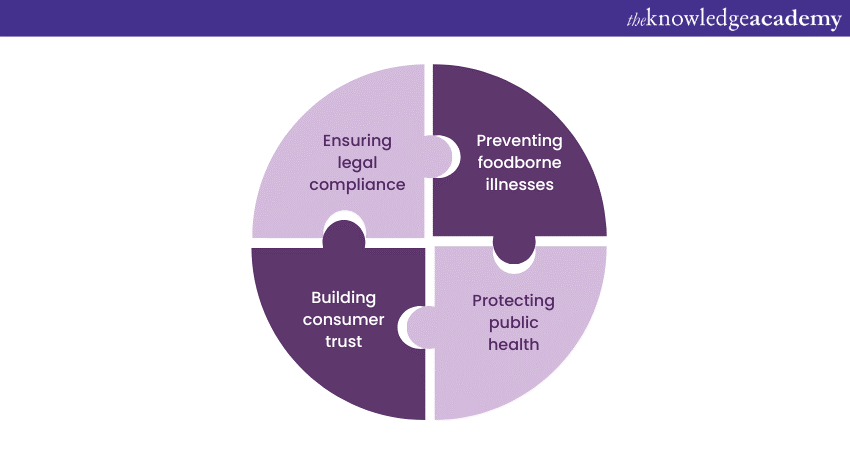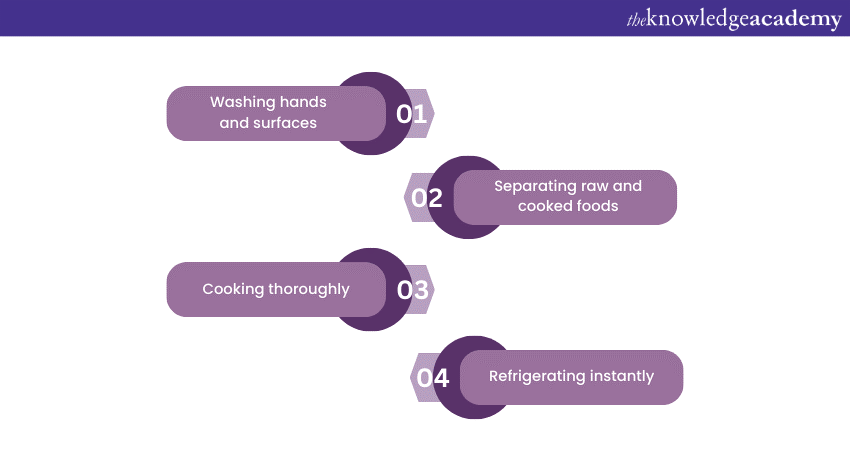We may not have the course you’re looking for. If you enquire or give us a call on 01344203999 and speak to our training experts, we may still be able to help with your training requirements.
Training Outcomes Within Your Budget!
We ensure quality, budget-alignment, and timely delivery by our expert instructors.

Food is one of the essential parts of our daily lives, which provides nourishment and enjoyment. Thus, Food Safety’s importance cannot be understated. Foodborne illnesses can have serious health implications, and ensuring Food Safety is crucial to safeguarding public health and maintaining consumer trust. But What is Food Safety, you may ask?
Food Safety involves various preventive actions, monitoring, and control mechanisms at every stage of the food supply chain, from farm to table. In this blog, we will discuss What is Food Safety and explore its importance, key components, global initiatives, and tips for maintaining Food Safety at home.
Table of Contents
1) What is Food Safety?
2) Scope of Food Safety
3) Key components of Food Safety
4) Importance of Food Safety
5) Global initiatives for Food Safety
6) Tips for ensuring Food Safety at home
7) Conclusion
What is Food Safety?
Before moving on to why is it important, let’s understand Food Safety’s meaning. Food Safety refers to the practices, procedures, and measures taken to make sure food is safe for consumption. It involves preventing, reducing, and eliminating biological, chemical, and physical hazards that could lead to foodborne illnesses or injuries. Proper Food Safety measures are essential at every stage to prevent contamination and maintain the integrity of the food supply chain.
Food Safety goes beyond simply avoiding obvious hazards; it involves a proactive and preventive approach that identifies and mitigates potential risks at every stage of the food supply chain. This includes the food industry and the individuals and organisations responsible for growing, harvesting, processing, transporting, storing, and preparing food.
Scope of Food Safety
The scope of Food Safety is vast and multifaceted, covering various aspects of food production, distribution, and consumption. Here are some of the scopes of Food Safety:

1) Food production and processing: Food Safety begins on the farms where crops are grown and animals are raised. It involves implementing practices that minimise the use of harmful pesticides, chemicals, and antibiotics. Proper animal husbandry practices are followed to ensure the well-being of livestock and prevent the spread of diseases that could impact human health.
In food processing facilities, stringent measures are taken to prevent contamination during processing, packaging, and labelling. Quality control processes are implemented to confirm that the final products meet safety standards and are accurately labelled.
2) Food distribution and transportation: Ensuring Food Safety during distribution and transportation is critical to prevent temperature abuse and cross-contamination. Refrigerated and frozen foods must be transported at appropriate temperatures to prevent the growth of harmful bacteria. Adequate packaging and storage conditions are maintained to preserve the safety and quality of the food products.
3) Food preparation and handling: Proper food preparation and handling are crucial to prevent cross-contamination and bacterial growth. This involves following safe cooking techniques, avoiding cross-contact between raw and cooked foods, and practising good hygiene in the kitchen. Individuals who handle food, whether at home or in food service establishments, must be trained in Food Safety protocols.
4) Food consumption: Consumers play a vital role in Food Safety by following guidelines for safe food handling and storage at home. Properly storing leftovers, reheating foods to appropriate temperatures, and avoiding consumption of foods that show signs of spoilage are essential practices.
5) Regulatory oversight and global cooperation: Government agencies and international organisations set and enforce Food Safety regulations to protect public health. These regulations define standards for food production, labelling, and handling. Organisations like the Codex Alimentarius Commission and the World Health Organisation work to harmonise Food Safety standards globally and promote collaboration among countries to address Food Safety challenges collectively.
Key components of Food Safety
Some of the key components of Food Safety are:
1) Personal hygiene: Maintaining proper personal hygiene is a fundamental aspect of Food Safety. Food handlers, including producers, processors, and cooks, must follow strict hygiene practices to prevent the transfer of harmful microorganisms to food. This includes regular handwashing, wearing appropriate attire, and avoiding contact with food when sick.
2) Safe food handling: Proper handling of food is crucial to prevent contamination. This involves storing, preparing, and serving food to minimise the risk of cross-contamination and the growth of harmful bacteria. Adhering to safe food handling practices reduces the likelihood of foodborne illnesses.
3) Proper food storage: Correct storage of food helps preserve its quality and safety. Different types of food require specific storage conditions to prevent spoilage and maintain freshness. Inadequate storage can lead to bacterial growth and deterioration of food quality.
4) Cross-contamination prevention: Cross-contamination can occur when hazardous microorganisms are passed on from one food item to another. It is essential to separate raw meats, poultry, seafood, and eggs from ready-to-eat foods to prevent the spread of pathogens. Using separate cutting boards, utensils, and storage containers for raw and cooked foods is recommended.
5) Cooking and temperature control: Cooking food to the appropriate internal temperature is vital for destroying harmful bacteria and ensuring its safety. Different types of food have specific temperature requirements for safe consumption. Using food thermometers and following recommended cooking guidelines helps prevent undercooked or overcooked dishes.
Importance of Food Safety

Note that Food Safety is not just a concern for the food industry but a fundamental aspect of public health and well-being. Hence, the significance of Food Safety cannot be overstated, as it directly impacts individuals, communities, and even economies. Let's explore why Food Safety is of utmost importance.
1) Preventing foodborne illnesses
One of the most compelling reasons for prioritising Food Safety is the prevention of foodborne illnesses. Contaminated food can harbour a wide range of harmful microorganisms, including bacteria, viruses, parasites, and fungi, which can cause human infections and diseases. These illnesses, often characterised by symptoms like nausea, vomiting, abdominal pain, diarrhoea, and fever, can range from mild discomfort to severe and fatal or life-threatening conditions.
By implementing strict Food Safety measures, the risk of contamination is minimised, leading to a major reduction in the occurrence of foodborne illnesses. Proper handling, preparation, and storage of food help ensure that harmful microorganisms are destroyed or controlled before consumption.
2) Protecting public health
Food Safety directly impacts public health on a large scale. When contaminated food enters the food supply chain, it can lead to outbreaks of foodborne illnesses affecting a significant number of people. These outbreaks can overwhelm healthcare systems, leading to increased hospitalisations and medical costs.
However, in severe cases, they can result in long-term health complications and even fatalities, particularly among vulnerable populations such as children, the elderly, and people with weak immune systems. By prioritising Food Safety, communities can minimise the risks associated with foodborne illnesses, reduce the burden on healthcare systems, and promote overall well-being.
3) Building consumer trust
Consumer trust is the foundation of any successful food industry. When consumers believe the food they purchase and consume is safe, they are more likely to make smart choices and continue supporting food businesses. On the other hand, a single instance of foodborne illness outbreak linked to a particular brand or establishment can severely damage consumer trust and lead to reputational and financial losses.
By consistently adhering to Food Safety standards and transparently communicating about safety practices, businesses can establish themselves as reliable sources of safe and high-quality food. Once this trust is built, it can lead to customer loyalty and positive word-of-mouth recommendations.
Drive sustainability and compliance in your workplace with our Environmental Awareness Training – join now for a greener future!
4) Ensuring legal compliance
Regulatory bodies worldwide have established strict guidelines and standards for Food Safety. These rules and regulations are made to protect consumers and ensure that food businesses operate in a responsible and ethical manner. Failing to comply with Food Safety regulations can result in legal actions, fines, shutdowns, and damage to a company's reputation.
Businesses that prioritise Food Safety and invest in training their staff to adhere to these regulations demonstrate their commitment to legal compliance and their customers' well-
Global Initiatives for Food Safety
Several international organisations and initiatives play a pivotal role in setting guidelines, facilitating collaboration, and promoting awareness about Food Safety on a global scale. Here are some of the prominent global initiatives in the field of Food Safety:
Codex Alimentarius
The Codex Alimentarius Commission, established by the Food and Agriculture Organisation (FAO) and the World Health Organisation (WHO), is a globally recognised body that develops international food standards, codes of practice, and guidelines to ensure the safety, quality, and fairness of food trade. These standards cover various topics, including food additives, contaminants, labelling, and hygiene.
Codex standards are not mandatory but serve as a reference for national regulatory authorities to develop their own regulations. By harmonising international Food Safety standards, Codex promotes consistency in Food Safety practices across countries, facilitating trade while safeguarding public health.
World Health Organisation (WHO)
The WHO is a leading authority in global public health. Regarding Food Safety, the WHO provides scientific expertise, research, and guidance to member states. It plays a major role in shaping policies, regulations, and strategies that promote Food Safety and prevent foodborne diseases. WHO's efforts include:
a) Conducting risk assessments.
b) Providing technical support to member states.
c) Collaborating with international partners to address emerging Food Safety challenges.
The organisation's dedication to promoting safe food consumption contributes significantly to improving global public health outcomes.
Food and Agriculture Organisation (FAO)
The Food and Agriculture Organisation of the United Nations works in collaboration with WHO to establish and promote Food Safety standards. FAO focuses on various aspects of Food Safety, including sustainable agriculture practices, food quality, and Food Safety management systems. It provides technical assistance, capacity-building programs, and knowledge dissemination to support countries in implementing effective Food Safety measures.
Food and Drug Administration (FDA)
Although not a global initiative, the US Food and Drug Administration (FDA) is a significant regulatory authority with a substantial impact on global Food Safety practices. The FDA sets and enforces regulations for Food Safety in the United States (US), including food labelling, inspection, and quality control. Its guidelines and standards often influence Food Safety practices in other countries due to the interconnected nature of the global food supply chain.
Ensure your remote workforce's safety with our comprehensive Health and Safety for Homeworkers Training.
Tips for ensuring Food Safety at home
Maintaining Food Safety doesn't end at the production and distribution stages; it's equally important at the consumer level. How food is handled, prepared, and stored in your own kitchen directly impacts your health and the health of your loved ones. Here are some essential tips for ensuring Food Safety at home:

1) Washing hands and surfaces: Thoroughly washing hands before handling food and after handling raw meats, using the bathroom, or touching pets is crucial. Surfaces, utensils, and cutting boards should also be cleaned and sanitised regularly to prevent cross-contamination.
2) Separating raw and cooked foods: To prevent cross-contamination, keep raw meats, poultry, seafood, and eggs separate from ready-to-eat foods. Use separate cutting boards and containers for different food types and store them separately in the refrigerator.
3) Cooking thoroughly: Cooking food to the appropriate internal temperature is essential. Use a food thermometer to make sure that meats, poultry, seafood, and eggs are cooked thoroughly, killing any harmful bacteria that may be present.
4) Refrigerating instantly: Perishable foods should be refrigerated promptly to slow the growth of bacteria. Keep the refrigerator temperature at 4.4°C or below and the freezer at -17.8°C or below. Leftovers should be refrigerated within two hours of cooking.
Conclusion
Food Safety is a vital aspect of our daily lives that impacts our health, well-being, and overall quality of life. Food Safety is a shared responsibility encompassing every step of the food journey, from production to consumption. By understanding Food Safety meaning, its principles and following best practices, we can protect our health, support businesses, and contribute to a safer food supply for all. We hope our blog has answered your question on “What is Food Safety?” with the right blend of facts and knowledge.
Elevate your Food Safety expertise with our comprehensive Food Safety Masterclass!
Frequently Asked Questions
Upcoming Health & Safety Resources Batches & Dates
Date
 Health and Safety in the Workplace Training
Health and Safety in the Workplace Training
Fri 9th Aug 2024
Fri 15th Nov 2024







 Top Rated Course
Top Rated Course



 If you wish to make any changes to your course, please
If you wish to make any changes to your course, please


